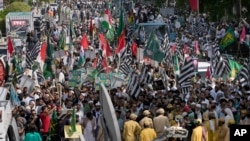Thousands of supporters of Pakistan's coalition government Monday gathered outside the country's Supreme Court demanding the chief justice resign for releasing former prime minister and leading opposition politician Imran Khan.
Buses and vans transported people from around the country to the capital, Islamabad, where they made their way into a high-security zone, housing the top court and other key government buildings.
The rare agitation underscores tensions between incumbent Prime Minister Shehbaz Sharif's embattled coalition government and the country's judiciary.
Last Tuesday, paramilitary soldiers dragged and arrested Khan, leader of Pakistan Tehreek-e-Insaf (PTI) Party, the country's largest, from outside a federal court on corruption charges.
The dramatic arrest of the 70-year-old PTI chief came as he awaited a hearing on the more than 100 legal cases facing him since a parliamentary vote of no-confidence ousted him from office in April 2022. The allegations range from corruption and sedition to terrorism and murder.
But Supreme Court Chief Justice Umar Ata Bandial on Thursday ordered Khan's immediate release, declaring his arrest “unlawful” and in violation of his right to seek justice.
On Friday, the federal court where Khan was taken into custody protected him from arrest until later this month. Khan accused the Pakistani military of orchestrating his arrest.
The successive judicial rulings drew a rebuke from Sharif and other leaders of his multi-party coalition, known as the Pakistan Democratic Movement, or PDM. They accused the top court of giving "undue reprieve" to Khan.
While protesters gathered outside the Supreme Court, PDM lawmakers and federal ministers in fiery televised speeches in the National Assembly — the lower house of parliament — condemned the chief justice and his rulings in favor of the opposition leader.
Defense Minister Khawaja Mohammad Asif called for legal proceedings against the alleged "misconduct" of the chief justice and several co-judges to remove them from office.
The fundamentalist Islamic party, Jamiat-e-Ulema-Islam (JUI), a coalition partner, led Monday's pro-government rally. Its chief, Maulana Fazalur Rehman, has called on students from thousands of JUI-run countrywide madrassas, or religious seminaries, to converge on Islamabad.
"We are here to protest the Supreme Court decision that relieved a criminal. They keep ruling in favor of this one person, Imran Khan," said Fazle Azeem, a JUI activist at the rally.
Workers of Sharif's Pakistan Muslim League-Nawaz or PML-N and those of other partners in the 13-member coalition also joined the rally.
"They give him a blanket immunity. We want him [the chief justice] to make decisions according to the law and the constitution. That’s what we are going to ask him to do," said Uzma Kardar, a PML-N member.
Television footage showed protesters climbing security gates and forcing their way into the so-called high-security "red zone” without being challenged by security forces, despite a ban on such gatherings in the capital. The rally remained peaceful.
Last week, police used tear gas and baton charges and detained hundreds of Khan supporters for breaching the ban as they protested his arrest.
"Meanwhile, these goons are being facilitated by our security agencies to take over the Supreme Court and subvert the Constitution. All citizens be ready for peaceful protests as once the Constitution and SC are destroyed, it is the end of the Pakistan dream," Khan wrote on Twitter.
He accused the government of arresting around 7,000 PTI workers, including women and most of the senior leadership, in a nationwide crackdown on his party. The arrests were made "without investigation into who was responsible for arson on government buildings or dozens of deaths of unarmed protesters by bullet wounds,” Khan insisted.
The violence reportedly killed at least 10 people. But the government banned coverage of the unrest on local television channels. It suspended mobile internet services and access to social media platforms such as YouTube, Twitter and Facebook, until the protest subsided late on Friday.
Internet services and social media platforms in Pakistan have since remained restricted.
Sharif said culprits involved in violent protests would face trials in anti-terrorism courts.
The military said in a statement Monday that it had collected “irrefutable evidence” about “spoilers” and would bring them to justice under relevant laws, including the Pakistan Army Act. The law, among other actions, provides for the administration of military justice, including trial and punishment of army personnel.
Khan promptly responded to the military announcement and demanded an independent inquiry into last week's events, saying his party was being targeted under a “planned conspiracy” to get the party banned. He demanded an impartial investigation into the violence.
“We have ample amount of evidence to present to any independent inquiry that the arson and in some places, shootings, were done by agencies men who wanted to cause mayhem and blame it on PTI so the current crackdown would be justified,” Khan said on Twitter.
The use of the special military law against political activists worried critics and prompted calls for reviewing the decision.
“Justice should be served in civilian courts, ensuring transparency and adherence to fundamental rights,” tweeted Baqir Sajjad, a Pakistani fellow at the Wilson Center in Washington. “By approving military trial, these fundamental rights will be compromised and [a] dangerous precedent that undermines rule of law will be set."
On Monday, Khan appeared before a court in the eastern city of Lahore along with his wife, Bushra Bibi, where the judge granted bail to the first lady until May 23 in the graft case that had led to Khan's brief arrest last week.
The Sharif government maintains corruption cases against Khan are being investigated and instituted by the independent anti-graft National Accountability Bureau.
Khan rejects all allegations and maintains they are a pretext for Pakistan's powerful military to block him from returning to power in elections scheduled for the fall and ban his party.








